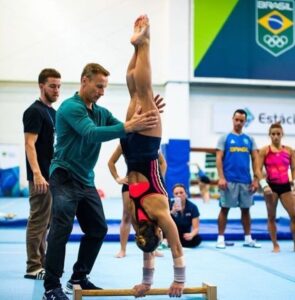I’ve recently returned from a trip and while on the road, I caught a few Olympic competitions on the tv, and this had me reflecting on the importance of coaching for success. You see, in a work context, leaders often focus more on sharing their knowledge. Now this is awesome but it’s also important to take it one step further by turning knowledge into practice. Let’s unpack this further. On your mark, get set, let’s go!
“Great coaches teach the knowledge they share.”
Nathan Jamail, Author, Keynote Speaker
As Leaders in the Middle (LIMs), many of us have years of experience building our knowledge in areas of leadership, selling and personal interaction. These techniques make a big difference in the quality of service we provide to our clients. The thing is though, that these are not traits one merely learns and immediately masters. It is something we coach ourselves and others to learn, understand and constantly work to perfect it. Like the Olympians, we must train every day to extract the best from ourselves. Similarly, we must also coach our employees to help them reach their full potential.
Turning Knowledge into Practice
Ok, so we know the saying that practice makes perfect, but how often do we stick to this philosophy (or the idea of it as there is never really perfect)? When things get hectic on the job, it’s easier sometimes to just get tasks done ourselves. When we get caught up in the moment, our brain often tells us we’re the only ones that can do it/fix it/ save it; however this outlook is wrong and will cost you time, money and future issues in the long run. It is a short-term solution to a long-term issue that means our employees miss out on valuable learning experiences.
What’s more is that this will permanently become our issue to solve if we don’t coach others around us. I’m sure you have enough on your plate on a day-to-day basis that you do not want this to happen. So, here’s my advice,
“Turning knowledge into practice requires leaders to take the time to teach, practice and scrimmage on a consistent and long-term process.”
Nathan Jamail, Author, Keynote Speaker
Remember, the number one job of any great leader is to make our people better not just more knowledgeable. So coaching for success means investing time to teach your employees.
Teaching vs Telling
So at this point you might be nodding your head in agreement. You might even be thinking, “Yup, I tell my team what to do all the time and they get it done, no questions!” But here’s the thing, blind loyalty and a herd mentality does not create the rich environment of a strong team. It’s important for them to understand the why behind the action. Here’s my take:
“Teaching is about sharing the principle behind the activity and the intent behind the action.”
Nathan Jamail, Author, Keynote Speaker
This helps employees develop their conviction behind their words and actions. It empowers them and builds their skills all in one go.
Let’s look back at our Olympians. At no point does a coach just tell his gymnasts to do cartwheels and expect them to get it done without further explanations. Nope, that would lead to broken parts and general frustration for all. Instead, he dedicates the time to help them understand why it’s important to tumble the correct way. He will also have training sessions where they see how to correctly tumble. Then, after coaching them and embedding the principles for success, he puts them out there to get the job done and go for the gold.

Here’s what I want you to takeaway today, when sharing knowledge with a person, employee, or peer, do the following three things to successfully coach them:
- Share the principle and the reason why
- Teach and practice how to put that knowledge in to practice.
- Follow up- and do it again
I love coaching and I firmly believe in the power of teams, coaching and creating a winning culture. Check out my book, ‘Coach Up, Serve Down’, for even more ideas. See you next week!


